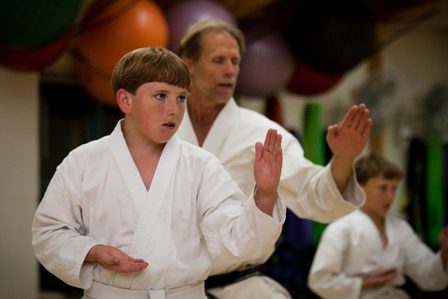I guess everyone has heard or read about haiku, the famous Japanese form of short poetry stretching back to the 1600s. Combining simplicity with emotional language and content, in a quite compact form, they come very handy when you feel you need a small dose of poetry in your life.
Not too much, not too little.
I think everyone needs a little poetry. But, it is often hard to get people to read poetry, since they can’t really relate to all that wishy-washy love-stuff that 99% of poems consist of.
Therefore, I have taken matter into my own hands.
I have taken a bunch of famous haiku poems, and… “tweaked” them a little, to get that Martial Arts feeling into poetry. Maybe that will spice things up. Changing only one or two words in each haiku really gives you a whole new feeling when reading it.
For these haiku, I chose Kobudo as the “special ingredient”. You can do this with anything though; Karate, Boxing, Grappling, anything. It will be just as much fun. You just find a haiku you like, and start changing! But not too much. Only one word or two.
Now, before you read my own “Kobudo-versions” of famous haiku, it is good if you have basic knowledge of the Kobudo weapons (their names, material, shape etc). It will be much more fun that way. So get your Kobudo facts straight, and let’s go!
Here’s your dose of Kobudo poetry! (they last longer if you read slower, by the way)
First out is five haiku from the famous Matsuo Basho (1644–1694):
Temple bells die out.
The fragrant blossom remain.
Sound of clashing sai.___
Harvest moon:
around the pond I wander,
floating bo.___
An old silent pond…
A frog jumps into the pond,
splash! Wet gi.___
The first cold shower,
even the monkey seems to want,
shelter under my timbe.___
In the cicada’s cry,
no sign can foretell,
when the kama flashes by.
Next up we have three haiku originally written by Kobayashi Issa (1763-1828):
A giant firefly:
that way, this way, that way, this –
And it lands on the bo.___
A sign of blessing.
The snow on the quilt.
Rusty sai.___
Trusting the Buddha, good and bad,
I bid farewell,
to my broken bo.
Then we have two from Shiki Masaoka (1867-1902):
A lightning flash:
between the forest trees,
I am training kobudo.___
After killing
a spider, how lonely I feel,
holding my bo.
By Kijo Murakami (1865-1938):
First autumn morning:
the mirror I stare into
shows a black eye from the nunchaku
Shuson Kato (1905-1993):
I drop my tekko
and realize my three children
have been watching.
Soseki Natsume (1867-1916):
Over the wintry
forest, winds howl in rage.
Sai blows way.
Kojo (rest unknown):
Night, and the moon!
My neighbor, playing on his flute –
Me – getting the nunchaku.
Takarai Kikaku (1661-1707):
Springtime in Edo,
not a day passes without
blisters from the tonfa.
Kaya Shirao (1738-1791):
In the dark garden
Of the night,
The weapons remain quiet
And finally, one from Kaga no Chiyo (1703-1775):
I wonder in what fields today,
he chases dragonflies in play.
The boy who stole my bo.
____
That’s it. Now I’m all out of fantasy.
Your turn.



7 Comments